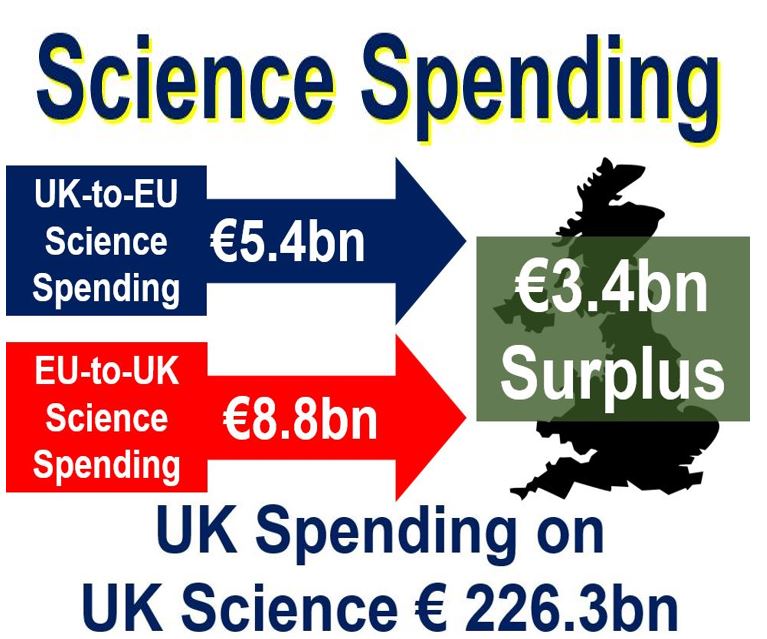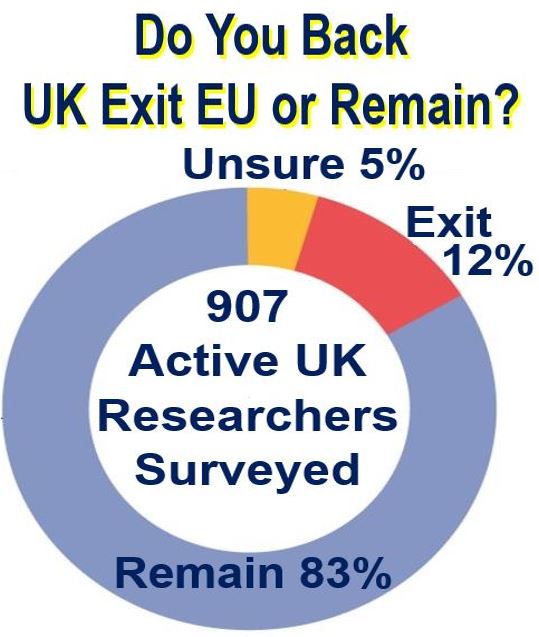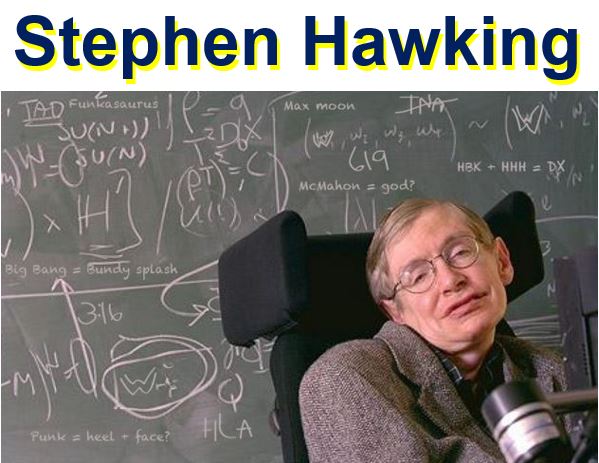Brexit – leaving the EU – would be bad for UK science, warn thirteen Nobel Prize winners. The Nobel laureates, all scientists, believe that if Britain left the European Union, the country’s status as a world leader in scientific innovation, research and development would be ‘at risk’.
In a letter to the Daily Telegraph, the scientists, including developmental biologist Sir John Gurdon, theoretical physicist Professor Peter Higgs, who predicted the existence of the Higgs boson particle, and geneticist Sir Paul Nurse, warned that without EU funding British research would be ‘in jeopardy’.
Great Britain helps steer the largest scientific powerhouse in the globe, the Nobel laureates insist.
 (Left) Sir Paul Nurse was awarded the 2001 Nobel Prize in Physiology or Medicine. (Middle) Sir John Gurdon was awarded the 2012 Nobel Prize for Physiology or Medicine. (Right) Prof. Peter Higgs was awarded the 2013 Nobel Prize in Physics. (Images: Wikipedia)
(Left) Sir Paul Nurse was awarded the 2001 Nobel Prize in Physiology or Medicine. (Middle) Sir John Gurdon was awarded the 2012 Nobel Prize for Physiology or Medicine. (Right) Prof. Peter Higgs was awarded the 2013 Nobel Prize in Physics. (Images: Wikipedia)
Their comments contradict the Leave camp, who have repeatedly claimed that it was a ‘myth’ that funding came from the EU.
Science must be debated more
While the economy, sovereignty, immigration and national security are extensively debated, science has not been, even though it represents a major part of the economy and jobs. Science should be ‘front and centre in the EU debate’, the group wrote in the letter, because it is a key driver in economic growth, innovation and health.
The letter also said:
“The EU contains a critical mass of expertise, with more than one in five of the world’s researchers moving freely within its boundaries.”
“EU decisions about scientific policy, funding and regulatory frameworks affect science the world over, and are influenced by British scientists. On the inside, Britain has access to people and funding and wields global scientific influence, far greater than we have alone.”
 It is true that the UK receives more from the EU than it contributes to the EU regarding science funding. Vote Leave campaigners, however, say that compared to what the UK spends on UK science, the EU figure is tiny.
It is true that the UK receives more from the EU than it contributes to the EU regarding science funding. Vote Leave campaigners, however, say that compared to what the UK spends on UK science, the EU figure is tiny.
“The prospect of losing EU research funding is a key risk to UK science. Brexit assertions that the Treasury will make up this shortfall are naive and complacent, given that successive governments have allowed Britain to languish well below the OEDC and EU averages in its research investment as a proportion of GDP.”
“Science thrives on permeability of ideas and people, and flourishes in environments that pool intelligence, minimise barriers, and are open to free exchange and collaboration. The EU provides such an environment and scientists value it highly.”
Nature poll
A poll carried out at the end of March by the prestigious scientific journal Nature found that eighty-three percent of scientists were in favour of remaining in the EU.
Nature quoted a Vote Leave spokesman who said:
“The biggest myth in this campaign is that money that funds our universities, our farmers comes from a magical money tree in Brussels.”
“There is no such thing as EU money – it is all paid for by British taxpayers as part of the three hundred and fifty million pounds sent to Brussels every week.”
According to pro-EU scientists, British universities receive approximately sixteen percent of all their research funding directly from Brussels.
 Of the total who responded, about two-thirds said they plan to vote. Taking this into account, the figures shift slightly – to 14% Exit and 80% remain. (Image: adapted from nature.com)
Of the total who responded, about two-thirds said they plan to vote. Taking this into account, the figures shift slightly – to 14% Exit and 80% remain. (Image: adapted from nature.com)
Being an EU member state allows scientists to move freely between countries and to work with no restriction. This easy access to highly qualified researchers is vital if the UK wants to continue being a leading scientific nation, they argue.
According to Justice Minister, Michael Gove, part of the Leave camp, the money that the UK currently gives to the EU for being a member state could be invested in science if people voted to leave the economic bloc.
Angus Dalgleish , a cancer researcher, says EU regulations are stifling British research and development. He believes our scientists would make faster progress and more breakthroughs if the country left the EU.
Hawking and colleagues Brexit disaster warning
In March, 150 British scientists – including Prof. Stephen Hawking – sent a letter to The Times warning that leaving the EU would be a disaster for UK science. UKIP accused the scientists of ‘scaremongering’.
The letter warned that Brexit would stop top talent from coming into the country from abroad.
 Stephen Hawking led 150 Royal Society scientists against Brexit. (Image: hawking.org.uk)
Stephen Hawking led 150 Royal Society scientists against Brexit. (Image: hawking.org.uk)
The letter said:
“We now recruit many of our best researchers from continental Europe, including younger ones who have obtained EU grants and have chosen to move with them here.”
“Being able to attract and fund the most talented Europeans assures the future of British science and also encourages the best scientists elsewhere to come here.”
UKIP and Vote Leave argue that the UK pays €77.77 billion to the European Union and only gets back €47.5 billion – it has an annual deficit of €30.27 billion. This is bad for the economy and also British science, they say.
The letter added:
“If the UK leaves the EU and there is a loss of freedom of movement of scientists between the UK and Europe, it will be a disaster for UK science and universities.”
“Investment in science is as important for the long-term prosperity and security of the UK as investment in infrastructure projects, farming or manufacturing; and the free movement of scientists is as important for science as free trade is for market economics.”
Regarding the letter, Dr. Julia Reid MEP, UKIP’s science spokesperson, said:
“This is a facile argument because long before the UK joined the Common Market, and before the implementation the of EU’s Single Market policy, there was always free movement of scientists throughout Europe and the world.”
“If anything the UK’s current immigration policy, driven by the large numbers of EU citizens coming from Eastern Europe, mean that we discriminate against the young talented scientists who wish to come to the UK from the rest of the world.”
“I am astonished at the content of this letter that has appeared in The Times. Clearly, these academics fail to recognise that the EU is a failed experiment.”
“Scientific and medical research in the UK is the envy of the world. Seven out of the top ten European Universities are in the UK, four of which are in the top five. It is our research and academic excellence which will attract investment in scientific research to the UK and not the fact that we are part of a failing political union.”
“If we look at the global picture it becomes clear that in the modern world the leading centre of research is not the EU but elsewhere, primarily the United States and China, and remaining a member of the EU, far from enhancing our ability, in fact restricts it. You only have to look at the scientific research published in 2014 to see that the lions share comes from the US and China with the UK third.”
Video – EU referendum opinion by Stephen Hawking
Stephen Hawking argues that the UK needs to belong to a large group of nations both for its security and trade.
